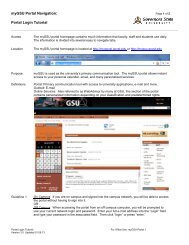Master of Occupational Therapy Program - Governors State University
Master of Occupational Therapy Program - Governors State University
Master of Occupational Therapy Program - Governors State University
You also want an ePaper? Increase the reach of your titles
YUMPU automatically turns print PDFs into web optimized ePapers that Google loves.
I. Obtain all necessary approvals prior to initiating research activities.<br />
J. Report all gifts and remuneration from individuals, agencies, or companies in accordance<br />
with employer policies as well as state and federal guidelines.<br />
K. Use funds for intended purposes, and avoid misappropriation <strong>of</strong> funds.<br />
L. Take reasonable steps to ensure that employers are aware <strong>of</strong> occupational therapy’s<br />
ethical obligations as set forth in this Code and Ethics Standards and <strong>of</strong> the implications<br />
<strong>of</strong> those obligations for occupational therapy practice, education, and research.<br />
M. Actively work with employers to prevent discrimination and unfair labor practices, and<br />
advocate for employees with disabilities to ensure the provision <strong>of</strong> reasonable<br />
accommodations.<br />
N. Actively participate with employers in the formulation <strong>of</strong> policies and procedures to<br />
ensure legal, regulatory, and ethical compliance.<br />
O. Collect fees legally. Fees shall be fair, reasonable, and commensurate with services<br />
delivered. Fee schedules must be available and equitable regardless <strong>of</strong> actual payer<br />
reimbursements/contracts.<br />
P. Maintain the ethical principles and standards <strong>of</strong> the pr<strong>of</strong>ession when participating in a<br />
business arrangement as owner, stockholder, partner, or employee, and refrain from<br />
working for or doing business with organizations that engage in illegal or unethical<br />
business practices (e.g., fraudulent billing, providing occupational therapy services<br />
beyond the scope <strong>of</strong> occupational therapy practice).<br />
VERACITY<br />
Principle 6. <strong>Occupational</strong> therapy personnel shall provide comprehensive, accurate, and<br />
objective information when representing the pr<strong>of</strong>ession.<br />
Veracity is based on the virtues <strong>of</strong> truthfulness, candor, and honesty. The principle <strong>of</strong> veracity in<br />
health care refers to comprehensive, accurate, and objective transmission <strong>of</strong> information and<br />
includes fostering the client’s understanding <strong>of</strong> such information (Beauchamp & Childress,<br />
2009). Veracity is based on respect owed to others. In communicating with others, occupational<br />
therapy personnel implicitly promise to speak truthfully and not deceive the listener. By entering<br />
into a relationship in care or research, the recipient <strong>of</strong> service or research participant enters into a<br />
contract that includes a right to truthful information (Beauchamp & Childress, 2009). In addition,<br />
transmission <strong>of</strong> information is incomplete without also ensuring that the recipient or participant<br />
understands the information provided. Concepts <strong>of</strong> veracity must be carefully balanced with<br />
other potentially competing ethical principles, cultural beliefs, and organizational policies.<br />
Veracity ultimately is valued as a means to establish trust and strengthen pr<strong>of</strong>essional<br />
relationships. Therefore, adherence to the Principle also requires thoughtful analysis <strong>of</strong> how full<br />
disclosure <strong>of</strong> information may impact outcomes.<br />
<strong>Occupational</strong> therapy personnel shall<br />
A. Represent the credentials, qualifications, education, experience, training, roles, duties,<br />
competence, views, contributions, and findings accurately in all forms <strong>of</strong> communication<br />
about recipients <strong>of</strong> service, students, employees, research participants, and colleagues.<br />
B. Refrain from using or participating in the use <strong>of</strong> any form <strong>of</strong> communication that contains<br />
false, fraudulent, deceptive, misleading, or unfair statements or claims.<br />
8





